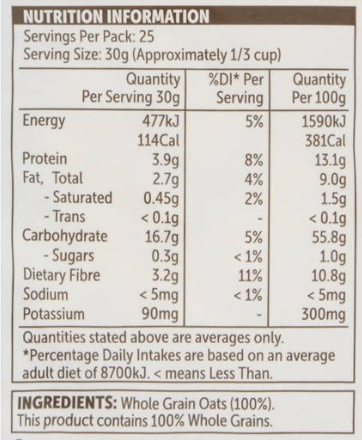Why Oats Are Not Your Friends: Unmasking the Truth about Oats on a Ketogenic Diet
As ardent proponents of the low-carb, high-fat carnivore diet, we firmly believe in the transformative power of such a way of eating. The ketogenic diet is a lifestyle centered on consuming quality meats, dairy, and other low-carb options while meticulously avoiding high-carb food items. This is more than just a weight loss strategy – it’s an entire approach to achieving optimal health. Today, we aim to debunk some common misconceptions about a so-called ‘healthy’ food choice – oats.
The Nutritional Vacuum: What Oats Are Not Offering
When scrutinizing the nutrient composition of oats, we find they offer relatively little to serve our bodies’ needs, particularly when we contrast them with meat, a typical staple of the ketogenic diet. For instance, oats lack many key nutrients that are essential for our well-being, such as Vitamin B12, heme-iron, DHA, and EPA. These nutrients are crucial for nerve function, oxygen transportation, and cognitive health, and they are most bioavailable in animal-based foods.
On the other hand, the high fiber content in oats, though often praised for its purported benefits to gut health and satiety, can actually impair the absorption of essential nutrients like zinc, iron, and calcium by binding with them in your digestive tract. This process can potentially lead to nutrient deficiencies, even in a diet that otherwise appears balanced.

The Insulin Conundrum: A Spike in the Wrong Direction
To maintain a state of ketosis, keeping your insulin levels stable is of paramount importance. The ketogenic diet, by its very nature, is structured to minimize insulin spikes and promote a steady state of blood sugar, which is a key factor in initiating and sustaining ketosis.
Enter oats. Oats are often touted as a ‘slow-release’ carbohydrate, suggesting that they won’t dramatically impact blood glucose levels. However, the reality is quite different. Even steel-cut or rolled oats, which are considered the least processed types, still have a moderate to high glycemic index (GI). This rating implies that consuming oats can indeed lead to a sharp increase in blood sugar levels.

This blood sugar spike prompts the pancreas to release insulin, the hormone responsible for transporting glucose from the bloodstream into cells where it’s used for energy. While this is a normal bodily response, the resulting insulin surge is counterproductive to the ketogenic lifestyle.
The main goal of the ketogenic diet is to shift the body’s primary fuel source from glucose (sugar) to ketones (produced by the breakdown of fats). This metabolic state, known as ketosis, promotes fat burning, enhances cognitive function, and improves energy levels, among other benefits. However, when you consume foods that lead to significant insulin spikes, like oats, you interfere with the process of ketosis. The surge of insulin signals your body that plenty of energy (in the form of glucose) is available, thereby shutting down fat burning and the production of ketones.
In essence, eating oats while following a ketogenic diet would negate the hard-earned metabolic adaptations achieved through a low-carb, high-fat lifestyle. Such a decision could disrupt your metabolic flexibility, defined as the ability to switch between glucose and fats as energy sources efficiently. In the long run, persisting with oats or similar high-GI foods in your diet could make it increasingly difficult to return to, and sustain, a beneficial state of ketosis.
Therefore, to fully embrace the benefits of a ketogenic lifestyle, it is crucial to understand the impacts of all foods on your blood sugar and insulin levels. And in the case of oats, it appears that their place within a ketogenic diet is highly questionable, if not entirely unwarranted.
The Glyphosate Quagmire: An Unseen Journey Beyond Harvesting and Processing
Let’s face it, most people consuming oats or porridge are not going out of their way to source the highest quality steel cut organic pesticide free varieties. Over 90% of the oats consumed are sourced from supermarket shelves. The path oats take from field to breakfast bowl is one that is sadly filled with chemical interventions. The use of glyphosate, a powerful and common herbicide, isn’t just limited to keeping the oat fields weed-free. Towards the end of the growing season, oats are often doused with this herbicide as a desiccant to hasten the drying process and make the crop easier to harvest.
What is the implication of this? Quite simply, the glyphosate doesn’t just vanish after its job is done. Instead, residues remain on the oats, persisting through processing and packaging, and ultimately landing onto your plate. And while regulations may exist concerning allowable glyphosate levels, the reality is that any level of this herbicide might have an impact on human health.
But how exactly does glyphosate affect us? Research points towards its negative impact on our gut microbiome, the thriving ecosystem of bacteria, fungi, and viruses that reside in our digestive tract. This microbiome is fundamental to many aspects of our health, from digestion and immunity to mood regulation and even weight management.
Glyphosate has been shown to have the ability to disrupt the balance of this delicate microbial community, potentially causing a state known as dysbiosis. In this condition, harmful bacteria can overgrow, and the diversity of the microbial population can decrease. Both of these effects have been linked to numerous health issues, ranging from obesity and diabetes to autoimmune conditions and mental health disorders.
Moreover, glyphosate can affect the ability of beneficial gut bacteria to produce important substances like short-chain fatty acids (SCFAs), which serve many crucial functions in maintaining gut health and systemic health. For instance, SCFAs have anti-inflammatory properties, support the health of the gut lining, and even regulate blood sugar levels.
In light of these findings, it’s clear that the glyphosate lurking in oats isn’t just an agricultural issue; it’s a pressing health concern. By consuming oats, we may unknowingly be introducing a substance into our bodies that can disrupt our gut health and potentially pave the way for a host of health complications. When we consider these risks alongside the numerous other concerns about oats in a ketogenic diet, the case against including this grain in our meals becomes increasingly compelling.
The Inflammatory Truth: Bloating and Gut Irritation
Oats contain a type of protein called avenin, a relative of gluten found in wheat. While not as potent as gluten, in sensitive individuals, avenin can trigger inflammation and bloating in the intestinal tract. This inflammation can lead to discomfort, and over time, potentially contribute to conditions like leaky gut syndrome, where the integrity of the intestinal wall is compromised, allowing unwanted substances to leak into your bloodstream.
Indeed, the inflammation induced by oats is not to be overlooked. In sensitive individuals, the consumption of oats and their inherent avenin can lead to an inflammatory response in the intestinal tract. The symptoms can range from mild discomfort, such as bloating and gas, to more severe issues like cramping and inconsistent bowel movements. This discomfort is not merely an inconvenience; it is a sign of your body reacting negatively to the substances you’ve consumed.
Chronic inflammation in the gut can lead to more serious conditions like leaky gut syndrome. In this condition, the integrity of the intestinal wall is compromised, allowing substances that should normally be confined to your digestive tract to leak into your bloodstream. This leakage can trigger an immune response, leading to systemic inflammation that affects your entire body, not just your digestive system.
The presence of antinutrients like phytic acid in oats adds another layer of concern. While these substances are a natural defense mechanism for plants, they are decidedly less beneficial for human consumers. Antinutrients can inhibit the absorption of vital nutrients, leading to potential deficiencies. Moreover, they can contribute to the inflammation and discomfort caused by avenin, further exacerbating the gut irritation and leading to a cycle of chronic inflammation that can be hard to break.
Antinutrients and Their Effect: No Friend of Human Digestion
Antinutrients in oats, specifically phytic acid, bind to essential minerals like calcium, iron, and zinc, thereby inhibiting their absorption by your body. This reduction in bioavailability can lead to deficiencies and associated health problems, from weak bones to impaired immune function. Additionally, these antinutrients can cause bloating, gas, and other uncomfortable digestive symptoms. In essence, while antinutrients may not be an immediate danger, their effects over time certainly counter the benefits of a nutrition-dense ketogenic diet.
Debunking the Feel-Good Myth: The Sugar Addiction Cycle
While it’s true that many individuals experience a sense of satisfaction and pleasure after consuming a bowl of oats, it’s essential to examine the underlying reasons behind this phenomenon. Contrary to popular belief, this feel-good sensation is more likely linked to the dynamics of sugar addiction rather than any inherent health benefits offered by oats.
When you consume oats, your body breaks down the carbohydrates into simple sugars, primarily glucose. These sugars are then rapidly absorbed into your bloodstream, leading to a surge in blood sugar levels. This sudden influx of glucose provides a temporary energy boost, commonly referred to as the “sugar high.” However, this spike is short-lived, and it’s followed by a subsequent crash as blood sugar levels rapidly drop.
The crash that follows the sugar high can leave you feeling fatigued, irritable, and craving more carbohydrates to regain that fleeting burst of energy. This cycle perpetuates a reliance on quick sources of glucose, leading to an ongoing craving for carbohydrates to recreate the initial “high” and counteract the subsequent crash. The addictive nature of this cycle is a hallmark of sugar addiction.
In the context of a ketogenic diet, this sugar addiction cycle is counterproductive. One of the key advantages of the ketogenic lifestyle is achieving a state of ketosis, where your body primarily relies on fat as its primary fuel source instead of glucose. By restricting carbohydrates and consuming a high amount of healthy fats, your body becomes efficient at utilizing fat stores for energy, leading to a steady and consistent energy supply.
Feeding a sugar addiction with oats disrupts the progress towards fat adaptation and metabolic flexibility that is sought after in a ketogenic diet. It reintroduces the unstable world of energy spikes and crashes, hindering the metabolic shift towards fat-burning. By relying on frequent, carb-heavy meals like oats, you thwart the benefits of ketosis, including improved energy levels, mental clarity, and weight management.
Choosing to avoid oats in a ketogenic diet promotes stable blood sugar levels and enables your body to sustain a steady supply of energy through the breakdown of fats into ketones. By breaking free from the sugar addiction cycle, you empower your body to tap into its fat stores and experience the consistent energy and metabolic advantages that ketosis provides.
In conclusion, while oats may provide a temporary sense of satisfaction, this feeling is rooted in the addictive dynamics of sugar rather than any true health benefits. On a ketogenic diet, embracing the stable energy supply derived from fat metabolism is crucial for achieving optimal health and metabolic flexibility. By eliminating oats and other carb-heavy foods, you pave the way for sustained ketosis and reap the full rewards of this transformative dietary approach.
In Conclusion: A Hard Look at Oats
In assessing the place of oats in our diet, we must weigh their real impact against their perceived benefits. Yes, oats may provide temporary satiety, but at what cost? The insulin spike, coupled with potential inflammation and gut microbiome disruption, seems a high price to pay. When you add the inherent lack of nutrient density, the presence of antinutrients, and the potential exposure to glyphosate, the scales tilt unmistakably in favor of eliminating oats from the ketogenic diet.
The benefits of a well-formulated ketogenic diet – stable energy, mental clarity, improved body composition, and potentially reduced risk of chronic diseases – greatly outweigh the fleeting satisfaction of a bowl of oats. As advocates for the ketogenic way of life, we can confidently say that embracing a low-carb, high-fat diet is a viable, sustainable approach to achieving optimal health. In that regard, oats, despite their ubiquitous presence in traditional “healthy” diets, don’t make the cut. As always, we encourage everyone to do their own research, tune into their bodies, and make informed dietary choices. Your health is worth it.
Disclaimer: The content of this post is provided for informational purposes only and should not be considered a substitute for professional medical advice. It is important to consult with a qualified healthcare provider before making any changes to your diet or lifestyle.

